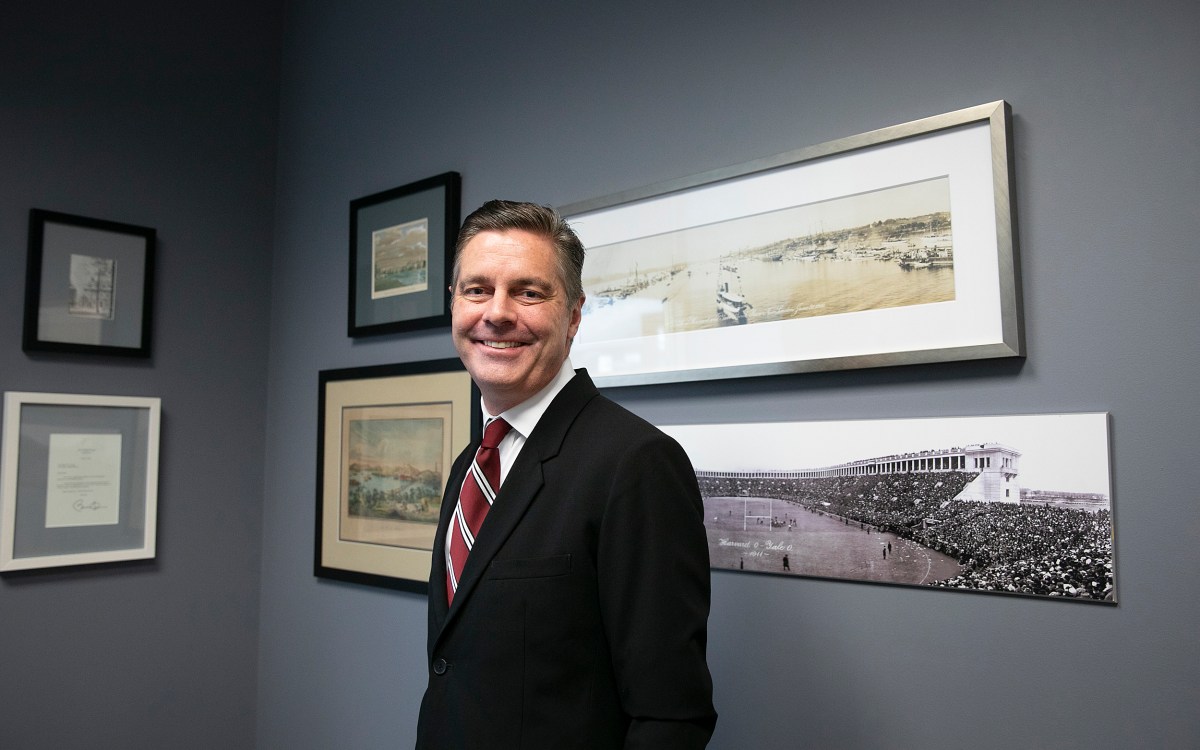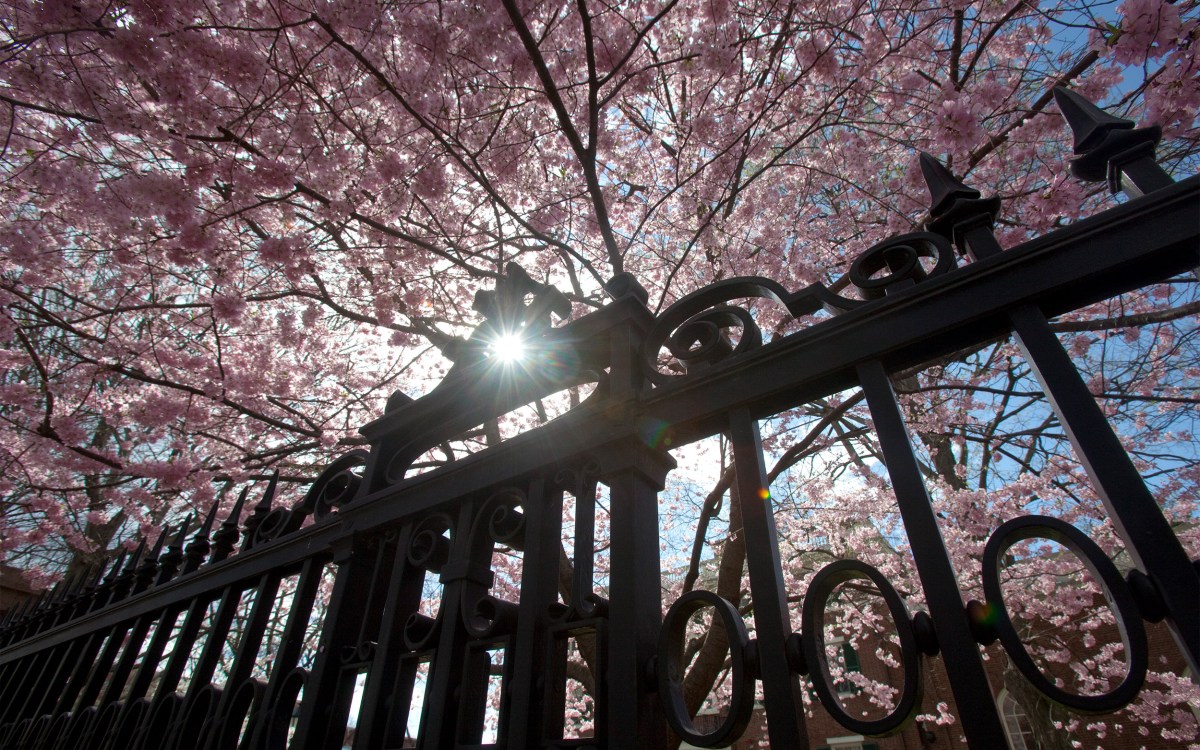In search of future Overseers
A former Overseer and the executive director of the Harvard Alumni Association discuss the work of the HAA nominating committee
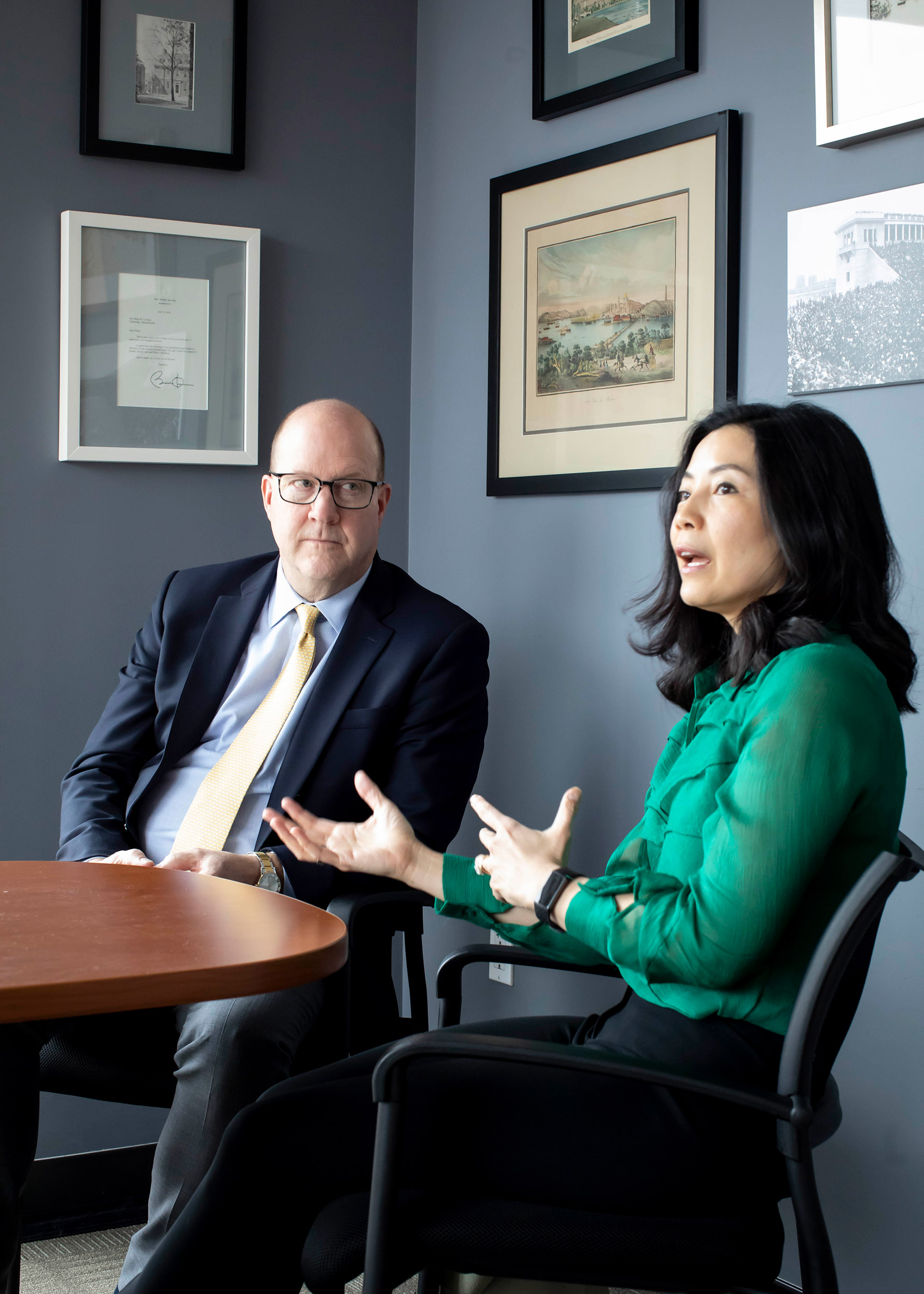
Harvard Alumni Association Executive Director Philip Lovejoy and Tracy Palandjian ’93, M.B.A. ’97, who leads the alumni committee that nominates candidates for Overseer.
Photos by Rose Lincoln/Harvard Staff Photographer
Each year, eligible Harvard degree holders have the chance to vote for new members of the Harvard Board of Overseers, one of the University’s two governing boards, alongside the Harvard Corporation. In addition, degree holders vote for elected directors of the Harvard Alumni Association (HAA). Every fall, before the usual spring elections, a committee of alumni gathers to review an extensive roster of potential candidates and to discuss, debate, and consider a multitude of factors before putting forward a slate of eight for Overseer. The 2020 elections will begin on July 1, having been delayed due to issues surrounding the COVID-19 pandemic, and will run through Aug. 18. This year’s candidates for the five openings on the Board of Overseers include eight alumni nominated by the HAA nominating committee and five nominated by petition. There are also nine candidates for six positions as HAA directors. The Gazette spoke recently with Tracy Palandjian ’93, M.B.A. ’97, who leads the alumni committee that nominates candidates for Overseer, and Philip Lovejoy, the HAA’s executive director, to learn more about the role of the Overseers and the alumni nominating committee process.
Q&A
Tracy Palandjian and Philip Lovejoy
GAZETTE: Tracy, can you start by sharing a little bit about yourself, your background, some of the leadership roles you’ve had at the University?
PALANDJIAN: How far should I go back? I grew up in Hong Kong and ended up on Harvard’s campus in the fall of ’89. It never crossed my mind then that I would later choose to become an American and make a life in this country. I graduated from the College in 1993 and from the Business School in 1997, and over the years I’ve been lucky to be involved in various leadership roles. I served as an Overseer from 2012 to 2018. I chaired the Overseers’ Schools committee, which gave me a real perch of looking at the entire University across all the Schools and the College. I was also active on the humanities and arts committee, and participated in the reaccreditation process in 2017, and from 2017 to 2018 I served as vice chair of the Overseers executive committee. My last year on the Board of Overseers coincided with the presidential search. Serving on the search committee was an extraordinary privilege. It allowed me to appreciate Harvard in completely new ways and see more fully the rapidly evolving dynamics in higher ed, the challenges and opportunities facing the modern research university.
Today, I chair the nominating committee; I’m on the Corporation finance committee; and I serve on various visiting committees — including the College and the Business School.
GAZETTE: Tracy, what did you know about the Overseers when you received the call asking you to run?
PALANDJIAN: I knew little. I knew that it was a distinguished group — judges, academics, nonprofit and business leaders, journalists, physicians. I knew the Corporation was the fiduciary body, but I didn’t appreciate some of the special responsibilities that the Overseers have. Besides the University’s president and the treasurer, the Board of Overseers has 30 members, all of them elected by alumni. That’s powerful and, to my knowledge, singular in higher ed. Most university boards either are entirely appointed or include a mix of appointed and elected members. Having a board that’s almost entirely elected by alumni reflects the deeply inclusive nature of our governance.
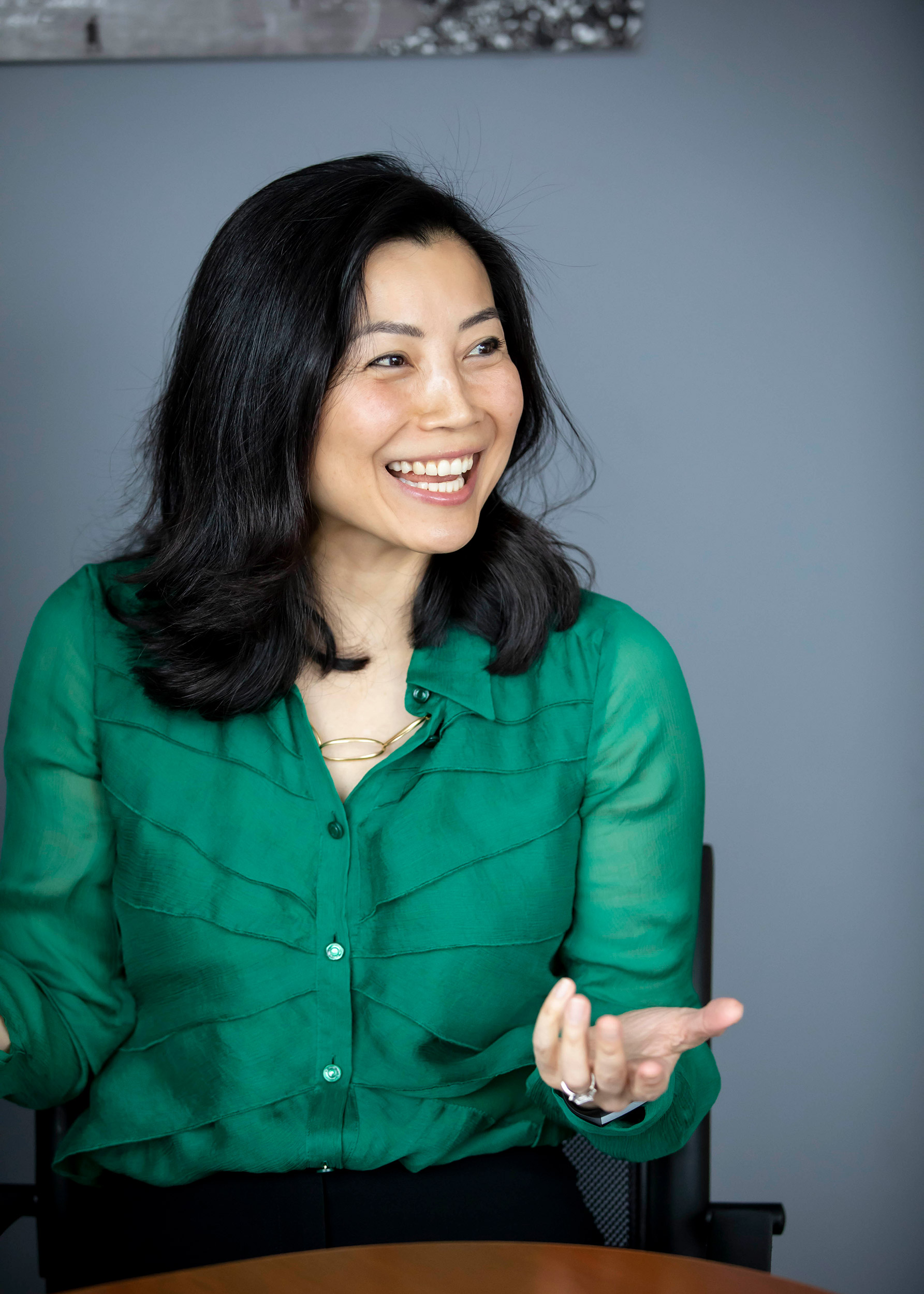
GAZETTE: How do you see the Overseers’ role?
PALANDJIAN: Each of us brings our own expertise and perspective to the job. The role of an Overseer is not to advocate for some particular set of issues that you are expert in or that you care really strongly about. You’re there to serve the whole University …
LOVEJOY: … to bring your knowledge and expertise to bear on the issues.
PALANDJIAN: All kinds of issues, and all in the context of working together in service of the long-term best interests of the University as a whole.
GAZETTE: Can you talk more about, for example, some of the special responsibilities you mentioned that surprised you when you were learning about the Board?
PALANDJIAN: The Overseers consent to the appointment of the president and other Corporation members, to name one. For example, when the presidential search committee presented its recommendation of Larry Bacow as the next president, the Overseers had to ratify that. But the primary responsibility of the Overseers is oversight through the various 50-plus visiting committees across the Schools, the FAS academic departments, and some other units.
LOVEJOY: The other day someone described this in a way that made a lot of sense: The Overseers focus on providing oversight for the academic enterprise and providing the University’s leadership with advice on a range of issues, while the Corporation exercises most of the traditional governance functions of a board of trustees.
PALANDJIAN: That’s well put — and the academic enterprise is the throbbing heartbeat of Harvard.
The composition of the visiting committees is really thoughtfully assembled. And there’s a great deal of independence; people are not shy about asking tough questions and challenging signs of complacency and inertia, because the whole point is to make the academic enterprise stronger. Visiting committees raise questions about how we can advance diversity, inclusion, and belonging; how Harvard compares to its peers and can learn from them; how we can innovate in teaching and learning and take the best advantage of technology; how different parts of Harvard can collaborate in new ways, especially across disciplines; how we can better integrate theory and practice; and a range of other challenges and opportunities facing Harvard and higher ed.
GAZETTE: Tell us about what the HAA nominating committee is and what it does.
LOVEJOY: There are 13 voting members on the nominating committee. Ten of them are appointed by the executive committee of the Harvard Alumni Association, and that executive committee is our volunteer alumni leadership. The executive committee takes the appointment of nominating committee members very seriously, ensuring that the diversity of the University community writ large has a voice in the process. They consider people across the many different cohorts that we represent. They look at what schools people attended, where they live, career paths, race and ethnicity — and per the HAA Constitution, they also include at least one alum who graduated within the last 10 years and another within 15 years from graduating. And the nominating committee also includes three present or recent Overseers who sit on the committee and bring a very important voice. The nominating committee really benefits from the expertise of people who’ve been in those seats, who understand what the board does and why they do it. They talk about the board as a collaborative team, one where members listen and learn, ask hard questions and offer constructive advice, bring their full self and all of their experience to bear for the benefit of the University. And they demonstrate what it is like to make that kind of commitment to the University.
GAZETTE: What’s the timing like for the nomination process? How often does the committee meet?
PALANDJIAN: It’s intense.
LOVEJOY: The work kicks off in September with a two-day, in-person meeting. In advance of that meeting each member receives a huge set of materials, really extensive research, for about 300 potential candidates for Overseer who have been nominated. They meet a second time in the fall.
GAZETTE: Can we talk more about the nominating process?
“Effective board members respect the difference between “overseeing” and managing. … They check their egos at the door, and they want to collaborate and learn.”
Tracy Palandjian
PALANDJIAN: Well, first and foremost, a wide net is cast.
LOVEJOY: A very wide net. It’s done through the outreach of the HAA, the deans, the Schools’ alumni associations, general research, and we do get nominations from individual alumni who write letters of support, for example.
We talk to various Schools, deans, and others about the alumni leaders they may know, so we do a lot of work that way. We also rely on the committee to a fair extent to surface potential candidates who should be considered, particularly as the members get to know and understand what the needs of the University are. In a given year, we might need more strength in science, for example, or in the arts, or in public service, or leadership of complex organizations, especially educational organizations. Or the committee may point out that we haven’t had anybody from a particular School in a while and consequently may then bring a candidate forward from that School. So, though not perfect, it’s a very thorough and thoughtful process. And it tends to produce a pretty remarkable set of diverse and distinguished candidates from year to year.
Last year, in 2019 — and I’m going to cheat and look at my notes here — we had candidates who included a former U.S. secretary of education, the chief medical officer of the San Francisco Health Network, the founder of Girls Who Code, a cancer biologist at MIT, a top management consultant based in London, an artist who does large-scale installations around the world, the head of the Iowa Department of Education, a health care entrepreneur, and an investor with deep expertise in technology.
GAZETTE: So, you have to go from 300 to eight nominated candidates in the end?
PALANDJIAN: Yes, and as Philip said, the deliberations are active and thoughtful. The committee takes this role very seriously. It’s an art rather than a science — we don’t have boxes to check off. And we look at the slate with a multiyear perspective to ensure the 30 members of the board represent optimal breadth and diversity. Yes, people disagree, have respectful debate, but at the end, the committee embraces the last eight who are selected.
LOVEJOY: I’ll never forget the first time I went to a nominating committee meeting, and I thought, “How is this going to work? You have 13 people, and you have 300 names, and you’re going to come down to eight that everybody agrees on?” But it happens! It happens through discussion and conversation, looking at people’s bios, looking at things they’ve written, looking at videos, and doing more research if needed.
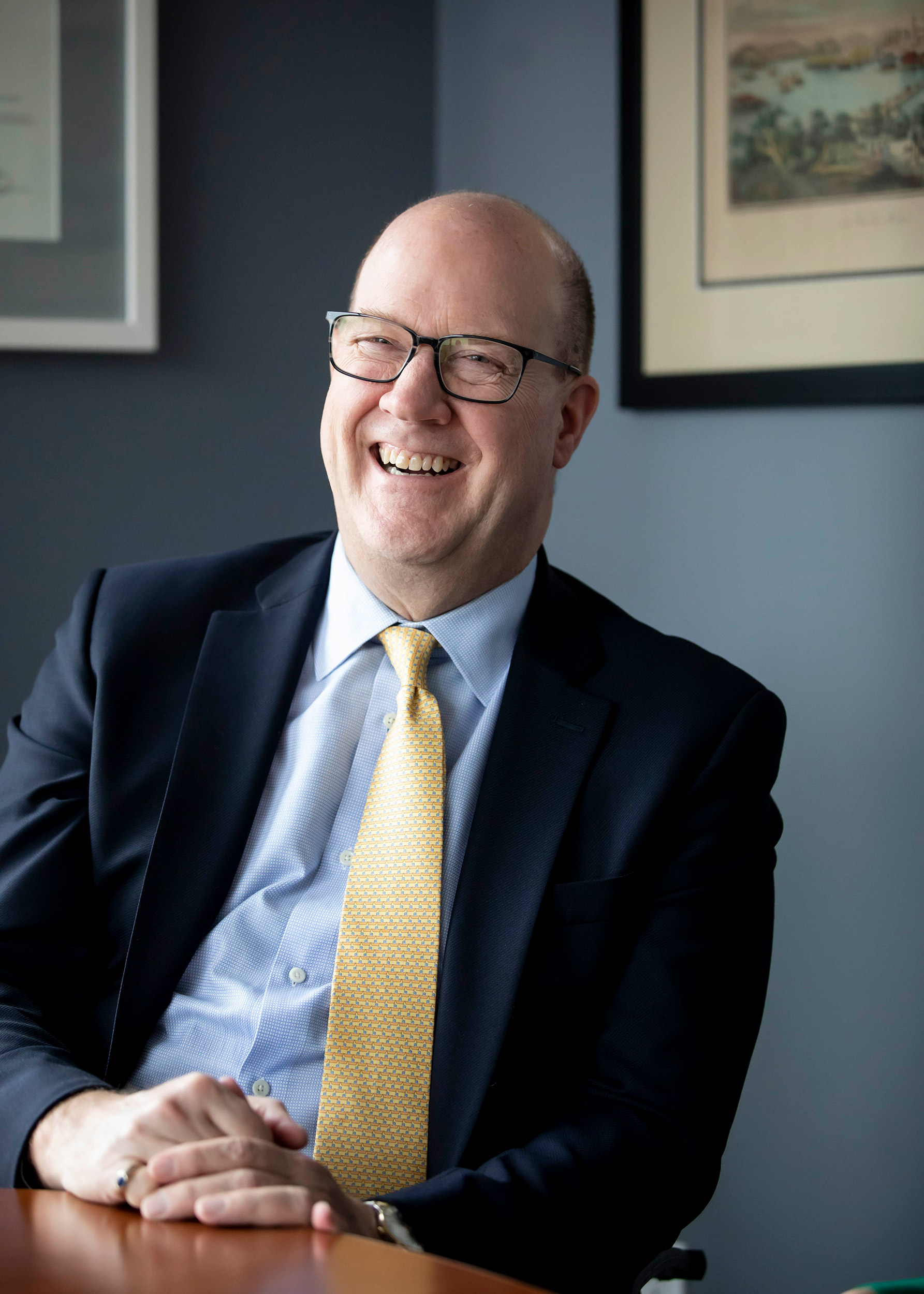
GAZETTE: I understand the committee also had a role to play in moving to online voting as an option, which was announced in 2016. Can you talk about that a bit?
LOVEJOY: The committee recognized the importance of encouraging all our alumni to vote and so they were a strong advocate for that. I’m a huge fan of online voting. It got our voting up relative to our alumni population, particularly international alumni. The number of votes cast last year by international alumni was directly proportional to the number of alumni who are international. In prior years, it was considerably lower. That empowered an important voice for us as a University.
GAZETTE: Tracy, you’ve been an Overseer yourself. What are the kind of things that you consider as you’re looking at this binder of 300 candidates?
PALANDJIAN: We care deeply about diversity, in the fullest sense. It’s not just diversity in terms of ethnicity, gender, School, geography, etc., but also diversity in experiential and professional domains, as well as diversity of perspectives and mindsets.
LOVEJOY: There are so many needs at an institution of this scale — all of the different Schools, from research to teaching, to activity in Allston, everything. We need experience from the arts and the sciences, from academia, or finance. And so that’s all part of the mix, in addition to ensuring that this board brings together people from different parts of the alumni body.
There’s a perception out there among a good number of our alumni that the board is made up of men on Wall Street. It’s not. The board is profoundly diverse and as such is representative of our alumni. It’s now almost two-thirds women. We’re finding that alumni are increasingly voting for women, for candidates of color, and candidates with diverse life experiences.
GAZETTE: So what makes an effective board member in your view?
PALANDJIAN: Effective board members respect the difference between “overseeing” and managing. They are thoughtful about the University as a whole, not just the parts that most connect with their personal interests. They check their egos at the door, and they want to collaborate and learn. They ask good questions, watch out for opportunities and challenges, and continue to make Harvard excellent in an enduring way.
GAZETTE: It’s interesting to think about Harvard’s impact in the world in the context of the role of the Overseers. President Bacow often says Harvard doesn’t exist to make ourselves better; we exist to make the world better. So how do you think about the balance between being responsible stewards of the existing enterprise but also being on the leading edge and pushing the University? Is that something the nominating committee thinks about when selecting candidates?
LOVEJOY: It’s a very interesting feedback loop of impact, because the people who are being nominated by the committee are having incredible impact out in the world. That’s what’s surfaced them as potential candidates, right? They build extraordinary careers; they’ve done just extraordinary things. So they are representative of the impact that we are trying to create. These alumni are living examples of that, and they’re bringing back that life experience to help guide the University to create more of an impact. That’s why I think it’s so important for us as an institution to have this body that is made up of alumni, chosen by alumni — because it continues to remind us why we exist and what we do.
Alumni have always pushed Harvard to be a better version of itself, and it’s through this mechanism [electing alumni to the Board] that that plays out. They come to serve Harvard, and to provide guidance and oversight on how Harvard can serve the world.
GAZETTE: Anything you want to say to alumni as elections approach?
LOVEJOY: This is an important way to bring their voice into governance, and so I would encourage them to pay attention, do their research, get to know what the board does, get a sense of what they’re voting for and who they would like to see guiding the University. What excites me about this institution is that the alumni voice is brought to bear in a very impactful way. And the election and the petition process are among the ways they are heard. We talk a lot about citizenship and being citizens of Harvard. This is a classic example of where you should exercise your citizenship. It’s your University.
PALANDJIAN: Yes, and I’d also focus on the long-term nature of the work of the board. The Overseers have a tremendous responsibility to guide and shape Harvard in an enduring manner, in terms of education, research, and serving society, especially during a time of great change in higher education. I’ll end with my Chinese grandfather’s favorite proverb: Speed tests the strength of horses; time tests the hearts of humans.
This interview has been edited for length and clarity. For more on this year’s elections and the candidates, see here.



